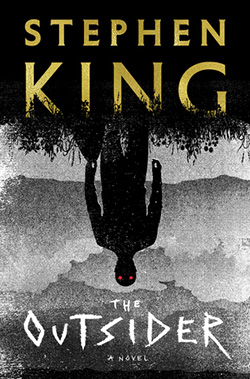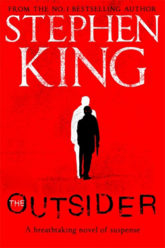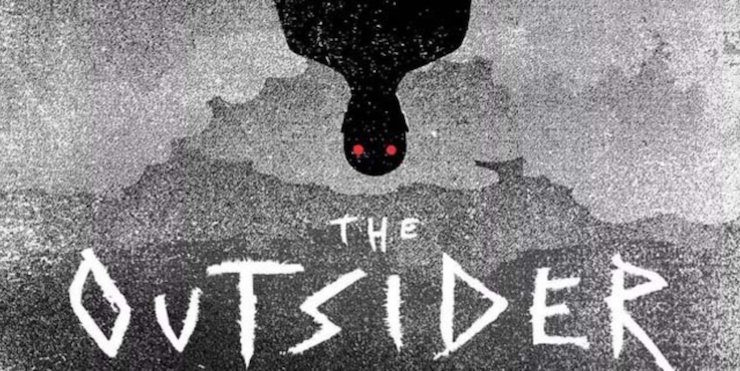Flint City is one of those places. Unless you’re thinking of retiring, or starting a family, you drive through it, not to it. It’s big enough to have a Little League team, but small enough that everyone—and I do mean everyone: baseball’s a real big deal here—knows the coach to nod at. Terry Maitland is his name, though to most he’s Coach T. And given how well the Golden Dragons have been doing in recent years, he’s become something of a local hero.
You can imagine the reaction, then—the hysteria that spreads like salmonella in street food—when Terry is arrested for the brutal rape and murder of a boy in full view of the something like sixteen hundred sports fans that had come to Estelle Barga Recreational Park to scream for the team he leads. All of a sudden they and theirs have a whole other reason to scream, and a brand new target, too.
You might think the local PD had a point to prove, apprehending Coach T in such a dramatic fashion, and you’d be quite right. Flint City as a whole had been on edge since little Frank Peterson’s butchered body was found, and a very visible arrest would do wonders for the community’s sense of security—not to mention look mighty nice on certain civil servants’ résumés. But let’s not by such cynics. Detective Ralph Anderson, the closest thing The Outsider by Stephen King has to a protagonist, is decent police—honest and humane—and even he believed he had his man.
That he was wrong just goes to show: you really never do know.
Buy the Book


The Outsider
One thing, however, is certain: there was no shortage of evidence of Terry’s guilt. The text’s opening section effectively alternates between the arrest itself and a staggering array of witness statements. We also learn, in the subsequent interrogation, of CCTV footage, a proliferation of fingerprints and, most damning of all, DNA. Terry’s DNA is absolutely everywhere, including on the murder weapon, the victim himself, and in the truck used in the abduction.
It can’t be, Terry essentially says. It simply can’t be, because he was somewhere else when all this awfulness occurred. “It’s like I fell into a Kafka novel,” he asserts, and honestly, it is, as in the following days the police look into Terry’s alibi, only to realise—too late, alas—that it’s iron-clad. Terry was indeed in Cap City, attending a Harlan Coben event with a few of his friends from work, all of whom are happy to support his story. And what do you know? The event was recorded; there’s footage of Terry asking his favourite author a question at the Q&A session that took place at exactly the same time as the actual killer kidnapped Frank.
Having been so sure of himself and his decision to take Terry in without interviewing him only hours before this blow, Ralph reels in disbelief, stretching desperately for an explanation. “Was it possible that the whole thing was a set-up?” he wonders. “An amazing but ultimately explicable act of legerdemain? Ralph didn’t see how it could be, but he didn’t know how David Copperfield had walked through the Great Wall of China, and Ralph had seen that on TV. If it was so, Terry Maitland wasn’t just a murderer, he was a murderer who was laughing at them.”
Despite the doubts that have dawned on our detective, the wheels of the justice system have already started turning, meaning that there’s no going back now—particularly given the circumstances of Terry’s arrest, which have all but convicted him in the court of public opinion. Regardless, Ralph recruits a few similarly suspicious sorts and sets about investigating what his more open-minded wife calls “the riddle of the two Terrys.”
There are suggestions early on that The Outsider mightn’t be a completely straight Stephen King story, including a few from the other Anderson, but it isn’t till the halfway point, following a terrific, if tragic twist and a remarkable reveal—I’ll only say that this is a secret sequel—that the novel’s supernatural aspects take shape. To wit, it’s a tale of two halves, both of which work very well. The first, outlined above, reads like the Finders Keepers series before it went weird. Its persuasive premise proves in practice tremendously tense, thanks to taut plotting and a desperate sense of jeopardy that makes Making a Murderer look like a snooze.
 In the second of the text’s novella-length sections it’s made plain that “there were monsters in the world, and their greatest advantage was the unwillingness of rational people to believe” in them. Standard Stephen King stuff, to be sure, but that isn’t to say it’s in the least routine. On the contrary, with half a book behind him and many of the pieces he needs already laid in place, King doesn’t have to draw out the unknown unnecessarily, as has often been his habit. Here, the climactic confrontation he’s tended to delay or wave away in his broad body of work comes quickly, and it, too, is short and sharp, leading to a compulsively-paced, if not entirely convincing conclusion.
In the second of the text’s novella-length sections it’s made plain that “there were monsters in the world, and their greatest advantage was the unwillingness of rational people to believe” in them. Standard Stephen King stuff, to be sure, but that isn’t to say it’s in the least routine. On the contrary, with half a book behind him and many of the pieces he needs already laid in place, King doesn’t have to draw out the unknown unnecessarily, as has often been his habit. Here, the climactic confrontation he’s tended to delay or wave away in his broad body of work comes quickly, and it, too, is short and sharp, leading to a compulsively-paced, if not entirely convincing conclusion.
Neither half of The Outsider is likely to stand shoulder to should with King’s very best efforts, be they conventional or speculative, but together, they make for one hell of a hybrid. Markedly more successful in splitting the difference and certainly more satisfying from a story standpoint than the back end of the Bill Hodges books which saw King try to do the same thing, The Outsider represents a rewarding return to form after a run of recent disappointments. That it’s not what you think it is is part of its power. The rest of its appeal comes down to King himself, who can be counted on, in terms of his narratives and his characters, to rise to the occasion when he’s hit on a particularly appealing idea—and it’s my pleasure to tell you, Constant Reader, that he clearly has here.
The Outsider is available from Scribner in the US and from Hodder & Stoughton in the UK.
Niall Alexander is an extra-curricular English teacher who reads and writes about all things weird and wonderful for The Speculative Scotsman, Strange Horizons, and Tor.com. He lives with about a bazillion books, his better half and a certain sleekit wee beastie in the central belt of bonnie Scotland.










